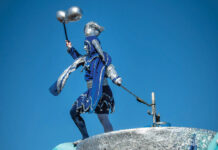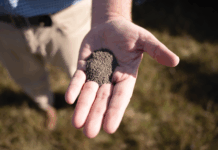
In 1981, Mobile native Eugene B. Sledge published a New York Times Best Seller, “With the Old Breed at Peleliu and Okinawa.” The book chronicled his life as a US Marine in World War II. At the behest of the publisher, who thought the book needed ‘tightening,’ parts of the original manuscript were cut — until now.
Henry Sledge has accessed the original, unedited work of his father. The son has taken these unpublished pages, copious notes and personal recollections to write a book of his own, “The Old Breed, The Complete Story Revealed.” This new book elaborates on his father’s original work.
We caught up with Henry Sledge for a discussion about his new book, the memories of Mobile and his father’s life as a marine.
First, tell us about your connection and memories of Mobile.
I was raised in Montevallo, Alabama, but I feel profoundly connected to Mobile, where Dad is from. From my earliest years of childhood, I have fond memories of visiting my grandmothers in Mobile during summers and holidays. They told me great stories about Mobile and its rich history.

Describe your father’s book, that your book derives from.
Throughout World War II, my dad carried a pocket-sized Bible that he kept notes in. Returning from the war, he took those notes and wrote an outline, and from that outline, began writing his manuscript.
My father had no intentions of getting this published. His idea was to write the story as a record for family use only; so we could understand his war experiences, what he did and saw.
But that changed when he asked my mother to type his manuscript so it would not be hand written. She did as requested but as she typed his work, my mom realized this was a very profound story and should be published. She was correct. His book became a New York Times Best Seller.
Why did you take on this project about 40 years later?
I wanted to write a book because of my passion for World War II history and Dad’s legacy. His book was highly regarded as a memoir. It spans from the day he enlisted in the Marines after Pearl Harbor, to his time on Peleliu, Okinawa, North China, occupation duty and returning back home to Mobile.
Seeing how I had a wealth of material that did not get published in the original version, I felt there would be an audience for that.
What influenced you to find a publisher?
My mother and I were having a conversation in the fall of 2021. She was aware of my passion for World War II history and the reputation of ‘With the Old Breed.’ She reminded me of his original unedited manuscript. A lot of material that she had typed had been cut from the published version.
I remember her telling me, “I think you should try to get your father’s omitted work and look at it. There is something there. You can get a book out of it.”
She was right. I started researching and writing the book in late 2021 and the spring of 2022. I finished the manuscript in the summer of 2023.
How did you find your father’s unpublished writings and process it into a manuscript?
My father’s original unedited manuscript is at Auburn University’s archives. I contacted Auburn and told the archives people what I wanted to do. They granted me permission to obtain and use this material.
After gathering the material, and there was a lot of it, the analyzation process took several months. Then I asked myself, “What is the best way to do this, to present it to the reader?” I decided the best way was to use my own voice as a narrative to string all of this together.
The basis of my narrative is my memories of growing up and talking to my dad about his World War II experiences.
As I transcribed his manuscript, the process took on — if I may borrow a scientific term — critical mass. By that I mean all of the memories of my father and his World War II experience as a Marine came to the surface. I used that as the basis to weave together all the unpublished bits from his manuscript.
Did your father influence you to become a writer?
I wouldn’t say that. I had interest in writing from my early days, but did not have aspirations to be a writer back then. As I grew more interested in the various aspects of war history, the idea of doing a book of my own was appealing. It took me a long time to come to terms with it. So many great books are published every year. What could my niche be? What would be my expertise?
Finding this unpublished material of my dad was a happy coincidence for me.
What do you want readers to learn from your book?
Before I went to the publisher, I asked some people to read it and tell me their thoughts. They said the book was great and told the story of a Marine at war. They also noted that of equal importance, the story was presented through my voice as his son. That is what I wanted.
I also want the reader to see how this galvanized experience of being a World War II Marine helped forge the kind of father and man he became in later life.
What are some of your memories of Eugene Sledge?
I think his sense of humor. You don’t go through that type of horrific combat experience without it costing you something years later. The great thing about my dad is that he compartmentalized things and did not allow the bad memories to affect our family life.
When talking to my dad about his memories of World War II, he always found a way to keep it positive. He had a great outlook on life and a great sense of humor. All of those things worked in concert to create a happy home life for us as a family.
Excerpt from “The Old Breed, The Complete Story Revealed”

One day when I was around three or four years old, I was sitting on the floor of the den of our house, looking out through the sliding glass doors to the patio during a heavy rain shower. The raindrops were hitting the bricks of the patio and splashing in every direction. Little ringlets redounded out from the center of each splash. My father knelt beside me and pointed out at the thrumming rain. “Look at that,” he said. “See the way the water splashes when it hits? Those are called water babies. They’re little elves splashing around in the water!”
In the spring of 1945, as American forces pushed the Japanese further south on Okinawa, my father and his fellow Marines were at the point of exhaustion. As they neared Shuri, the main Japanese defensive bastion on the southern part of the island, the fighting was as bitter and the environment as brutal as anything they had experienced yet. Sitting in his foxhole, on the edge of a ridge, my father could look out across a muddy, shell-torn field of death and destruction.
Directly below his gun pit was a flooded crater filled with a dead Marine. This poor man had been killed early in the fighting in that area. His grisly, skeletal remains created a horrific, vivid memory for my father. He remembered how the corpse lay with his back against the shell crater, still clutching a rusting BAR, his helmet resting against the side. The ghostly remains of his face under the cloth-covered helmet leered up at the sky as the rain poured down.
“His pack and web canvas ammo pouches for the big 20 round BAR magazines were all new and neatly adjusted.
“The man had been dead quite some time. In the rain, with the agents of decay rapidly at work, I saw the face vanish and rot away day by day.… The result was the most spine chilling and horrible expression imaginable.
“One night by the light of a star shell I looked down at the big BAR man and his awful, livid face grinning up at me in the pouring rain, and in the eerie light the white teeth, the jaws and the big black eye sockets formed a spectral visage beneath the helmet.
“The star shell flickered out. I shuddered in the rain. When another star shell whistled in and popped open, I could not bear to look back down at him.
Numb with fatigue, my father sat in the mud and filth, watching the raindrops splash on and around that corpse in the shell crater and remembering how, when he was a child, he was fascinated at how the rain splashed on and around a large green frog in a ditch in his family’s backyard. His grandmother told him that elves made splashes like that, and they were called water babies.
In later years, after reading his book, I reflected on this horrific scene, and I wondered if the young college professor kneeling beside his younger son and gazing out at the water babies on the patio might have still been trying to forget that day near Half Moon Hill on Okinawa.
Henry Sledge’s “The Old Breed, The Complete Story Revealed” is now available online and in bookstores.





